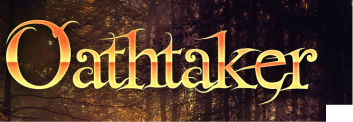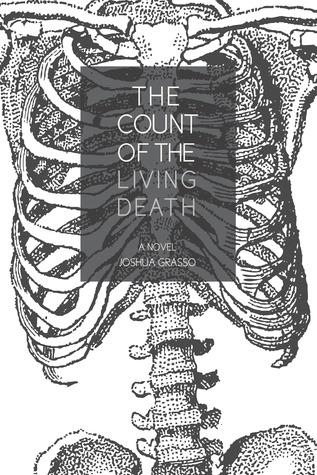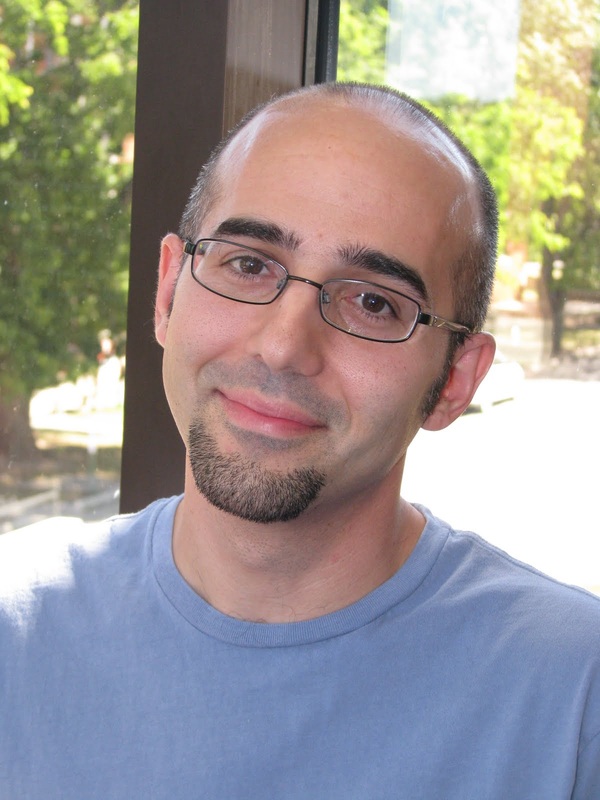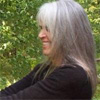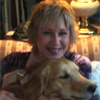Joshua, teaches English Literature, mostly British Literature from Shakespeare to the 19th century. A reader, a writer and an instructor, Joshua recently published a fantasy-comedy, The Count of the Living Death. See my review on Grasso’s work here.
Welcome, Joshua! I thought we would open with a quick question about The Count of the Living Death. Please share with readers what character most surprised you in this work and why?
At the outset, I thank you for this opportunity.
To your question, the character that most surprised me is Ivan, the half-brother of the main character, Count Leopold. I had originally imagined him as a kind of stock villain who would complicate things and then disappear without being a major element of the plot. But as I wrote, I realized how boring that was and how his hatred of the sorcerer, Hildigrim Blackbeard, had to be based on more than a mere dislike of sorcerers. . . so I created a back-story that connected him to the main plot in an important way and made him a much more interesting character to boot. In general, my first ideas don’t hold water. Writing often fleshes out what would otherwise be a very conventional idea. Ivan’s character ultimately changed the ending of the book as well, which was rather pedestrian in my original conception.
I understand. Sometimes the most fun I have had when writing has come quite by surprise. Those “viola!” moments have come upon me at the most unusual times. I have had my family in an uproar more than once, with a sudden shout of “Oh, I get it now!” or something to that effect. But, the greatest moments for me were those times when I was just writing away, my fingers clicking across the keyboard and then—I would stop. Did I just write what I think I just wrote? Are those words really there? Is it true—is that person really—? How did I not see that coming! I love those times. So, I am curious, other than the changes to Ivan’s character, was there anything else in your work that flowed from the tips of your fingers without your having been aware that it was coming? If so, how did you react? Did it change the story you thought you were going to tell?
I usually start with only a very rough outline of the work: only the ‘inciting incident’ (to borrow a scriptwriting term), something of the middle, and a general sense of how it will all end. With this novel, I actually just started writing the first chapter without any of this. I didn’t have any story ideas but had just finished a semester of teaching and desperately wanted to write something creative. The first chapter came out like a shot—a character in a coach being summoned somewhere in great haste, a sense of mystery, and something that had to be confronted. I re-wrote this chapter entirely once I figured it out, but the general tone remained, and it pretty much wrote the rest of the story for me. I always remember a letter from Tolstoy where he praised the beginning of an unfinished short story by Pushkin: “The guests arrived at the estate.” He loved that the story just opened with something seemingly important happening, so the reader wanted to know: who are they? Where are they? And why have they arrived? In the same way, I wanted to write a story that opened “in the middle” and asked me to provide the answer. The entire story became the answer to that mysterious opening chapter—who is he, where is he going, and who summoned him?
I will have to keep Tolstoy’s comment in mind when writing new beginnings. Speaking of new beginnings, the worlds created in fantasy works are the main reason I read in this genre. I am fascinated by the sense of adventure and the imaginations of fantasy authors. Occasionally a world is created that I might even like to visit. So, I am curious—what “other world” (which could be a time, place or fantasy place) created in any book you’ve written or read is the world you would most like to visit and why?
That’s easy, though the answer is perhaps disappointing coming from a fantasy author: Jane Austen’s England. I would love to visit and interact in the quiet, country world of Elinor and Marianne (from Sense and Sensibility), or hobnob with the social intrigues at Bath (as seen in Persuasion). Jane Austen is a tremendous influence on my work, and her world of almost claustrophobic company—just a few people in a house, a village, etc.—is the inspiration for many of my stories, which mimic the same locales and situations. No matter how fantastic, the characters are only a small band adventuring in a relatively confined space. No epic battles or time-traveling for me, as much as I love those qualities as a reader.
Jane Austen forever! So, with your literary credentials, I can’t help but wonder what work, created by someone else, do you most wish you had written yourself and why?
The novel I most wish I had written is Neil Gaiman’s Coraline. I feel I could have written that book (not as well, mind you, but the ideas and characters are so close to what I care about). It’s a perfect book, both the actual book he wrote and the graphic novel he collaborated on. Again, we have a small, confined world, one heroine, and a completely realistic, yet imaginary world. I also love how much he does within only a hundred or so pages; Gaiman is a master of concise, powerful writing and I always come away from his books with a mixture of awe, inspiration, and envy. I could do that—but I never will! My novel, The Count of the Living Death is an attempt to capture something of the feel and sensibility of Coraline, as is my first book (which is as yet unpublished).
I admit I have not read Coraline. It sounds like I will have to add it to my ever-growing TBR list. . . . My next question is, I think, a difficult one and it may be even more so to someone who teaches literature. But, here goes! What would you consider the five best works you have ever read and why do you rank them among the best?
Five favorite works (which could change at any given moment) would probably be Swift’s Gulliver’s Travels, Austen’s Sense and Sensibility, the “anonymously written” Sir Gawain and the Green Knight, Spiegelman’s Maus, and Shakespeare’s Sonnets. I choose these works from the thousands upon thousands of works I love because they represent some of the reasons I got into teaching as well as writing fiction.
Swift’s work blends science fiction and satire in a model that has been emulated by many—indeed, Planet of the Apes is virtually taken from Part 4 of the work, where Gulliver visits the land of the Houyhnhnms (the talking horses). The story is so wonderful and fantastic, yet it constantly slips away to expose the cutting—and at times, quite nasty—satire of his society. This novel is at the back of any work I write, and I’ve taught it many times over the years.
I talked about Austen earlier, but Sense and Sensibility is a novel of satire and romance, yet neither one is pushed in your face. The satire is powerful but subtle, and the romance is always behind the scenes—even the proposals all occur off-stage. The novel is a model of restraint, and yet no book leaves me with stronger feelings—I find it a deeply moving and inspiring work.
Sir Gawain and the Green Knight is my favorite work of fantasy, and only narrowly beats my second favorite work, Tolkein’s The Hobbit. Both works take a simple story—essentially, a quest narrative—and create a grand allegory of life, death, and individual purpose. Does Gawain fail? Is the Green Knight real? Is Morgan le Fay behind it all—or is that simply a clever way to mask the work’s real purpose? We never truly know, and you can read this short work dozens of times and find different answers.
Spiegelman’s Maus is one of the great graphic novels that uses metaphors to uncover the truth of history and the Holocaust (the Jews are mice, the Nazis cats, etc). Yet it’s a profoundly realistic and moving story, and one that questions how well we know anyone’s story—including our own.
The Sonnets are the most profound poetry I’ve ever read—an entire ‘play’ composed of a man’s admiration and love for a young man (whether platonic or not), that goes through a tempestuous relationship of love, doubt, betrayal, and loss. Finally, when the “dark lady” comes in at the end, the sequence becomes passionate and bitter by degrees, inspiring poetry that rivals anything in the plays, and has become part of our cultural mythology on love (both ideal and sexual).
I understand the difficulty in choose five favorites and how likely the list is to change over time. Occasionally, however, a work has no chance of making our favorites list because it does not speak to us. What do you do when you pick up a work that does not entertain you? Do you read to the bitter end? Or do you bow out early?
No, I never finish a work if I don’t like it or don’t feel compelled to finish. However, I spend some time asking myself why I don’t like it. Did I expect something else? Am I reading another work on top of the one I’m reading? Am I shying away from the ideas/truths in the book? Is the style something I need to grapple with? Is the plot supposed to be this unpalatable or non-existent? However, if I decide a book isn’t worth my time I abandon it and quickly move on—as an academic, I have so much to read, so much to grade, and so little time of my own. Once in a while, I even abandon my own writings for committing the capital sin of writing—inducing boredom!
I have traditionally been a “read to the bitter” end person, but with so many things to read, I’ve been re-thinking that of late! I’d like to turn your attention to literary heroes and villains. Who is your favorite heroic character—and in what way are you like him or her?
It’s hard to answer who my favorite heroic character is, since I don’t often admire ‘heroes’ per se. Many heroes in fiction and film are a little one-dimensional and hard to truly identify with. However, if we define heroes more as protagonists, who may or may not be heroic (or capable of a more simple heroism), my favorite heroine would be Anne Elliot from Austen’s Persuasion. She is a woman who has been neglected by her own family, convinced to foolishly turn down the proposal from the man she loved, and is now sailing through her twenties without any prospects except eternal loneliness. And yet she cultivates her mind, a few friendships, and wins in the end simply for being an aware, intelligent person. She’s Austen’s best heroine, or at least the most mature, and a model for anyone writing a strong female lead—one who is heroic simply by facing the music of life, even if doesn’t have a sword in hand. I’m not sure I’m anything like her, though I try to remember that life isn’t about rewards—it’s about what you do for the things and people you believe in. There is no greater reward than that.
Well put. So, who is your favorite villain—and here’s the twist—in what way are you like him or her?
My favorite villain by far is Iago from Shakespeare’s Othello. I adore his sinister, hypocritical nature; the way he can change masks on a dime, lie to everyone by subtly twisting (or misrepresenting) the truth, and be completely unrepentant in the end. He did what he did and he will say no more, no matter how they torture him. I’m not very good at writing villains, since I tend to believe that every villain is shaped by circumstances beyond him or her, and the same might be true of Iago; but I admire the skill with which Shakespeare portrayed his vengeful nature. Anything good said about anyone else takes away from his own self-image. While I don’t think I share this quality (!), I do admire his ability to act in whatever role the situation requires, which I think is the essence of a good actor or writer. You have to be anyone, imagine anything, and have your audience follow along. That’s what I try to do both as a teacher and a writer—figure out how to reach my audience by any means necessary, or do what the work, lesson, or story requires.
I so appreciate your taking time with me Joshua. I would like to close with a few final thoughts. In order to be certain that you’ve had an opportunity to speak to things that interest you (as opposed perhaps, to those things that interest ME), I must ask: what one question have you always wished an interviewer would ask you that you have not been asked and what is your answer to that question? Also, what one question do you most dread an interviewer asking you—and what is your answer to that question?
I would like an interviewer to ask me what I love more, writing or teaching? It’s also the question I most dread, since I don’t have a proper answer. I came to teaching much later in life, not entering a classroom until 2000, when I was in my mid 20’s and had already been writing for well over a decade. I saw myself primarily as a writer, and I figured grad school would help me along that path. But I fell in love with teaching and scholarship, and gradually, fiction became a distant second pursuit in my life. Only once I got my PhD and landed my first job did I resurrect my interest in writing fiction. Now, of course, writing takes many forms; I write articles on literature, which I publish regularly, I write paper assignments for my classes (as well as Bibles of graded comments!), informal reviews and posts on my blog, as well as novels and short stories. I could never live without writing, and yet, teaching has become my true passion, and I suspect, my actual talent. I have more experience writing, but I was more of a natural at teaching, and at the end of the day, it’s what I get paid to do. So if I had to choose, I would choose teaching (as I have), but I would also try to squirrel away a little writing on the side.
Finally, Joshua, I would offer a simple philosophy of mine: “words matter.” The tales we tell may entertain, influence, encourage deep emotions from, and even extend profound wisdom to, others. What one lesson, theme or principle would you most want others to take from your work?
The one lesson or principle I would like others to take away from my work is simply “observation.” We don’t know anything we think we know, at least not without a ton of observation, reflection, and speculation. My characters always think they understand the big picture only to find out how few pieces they actually possess. Nothing is as it seems, and the point of a story is to examine the pieces, walk the road, and determine where we truly are in the world. I think fantasy and science fiction are uniquely qualified to ask this question, since neither of them truly exist. They’re metaphors, creating a fantastic land or planet as an elaborate way of asking “what if?” The idea of reality is thrown out the window from the beginning, so we can read the characters both as people and types, images and ideas; rings are not just rings, any more than dragons are dragons. No matter how literal you want to make it, they represent something deeper—something mythic that we continue to use as metaphors because they speak of things we don’t truly understand. Metaphors come in handy when discussing the abstract since they help us visualize it. What is time, love, honor, life, death? A story can make this seem real, or at least tangible, long enough to ask this question. A fantasy story, and the ones I write, at any rate, are a way to construct a simple metaphor to ask larger questions that we all ask, but often forget to decipher the meanings of. Of course, the question shouldn’t slap you in the face; the point of a story is to be a story, tell a story, engage our imagination. Beneath it all, however, is the question, driven by the metaphors of a world that never existed and that we make exist solely to understand ourselves.
Thank you so much, Joshua, for joining me today!
Find out more about Joshua Grasso, fan and follow him on GoodReads here, follow him on BookLikes here and check out his website here. Joshua can also be found and you can “like” him on Facebook here. The Count of the Living Death is available from Amazon here.
Don't miss the sale on Amazon starting December 16--just in time for the holidays! Pick up a copy for yourself or for someone on your gift list.
